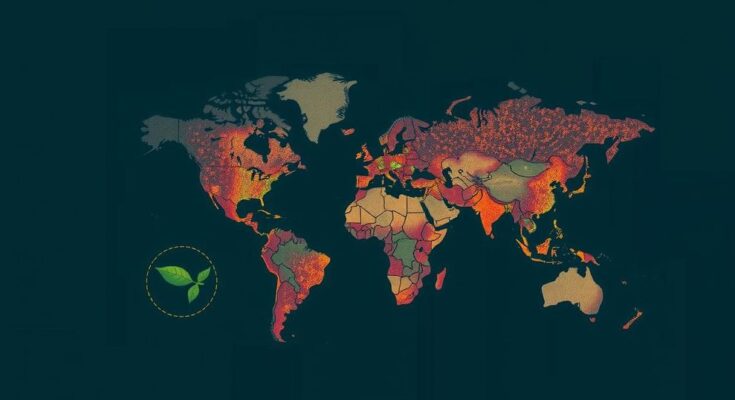Climate change is significantly undermining the four pillars of food security—availability, access, utilization, and stability—resulting in reduced agricultural output, heightened food prices, and increased health concerns. Immediate actions are required, particularly from the global community, to support the least developed countries and Small Island Developing States. Effective social protection programs have demonstrated their ability to maintain or improve living standards during climate-related shocks. Evaluating programs in nations such as Ethiopia and Kenya illustrates the varying effectiveness and highlights the need for customized strategies to strengthen resilience and food security.
Recent analysis underscores the devastating impact of climate change on food security in various communities worldwide. The four pillars of food security—availability, access, utilization, and stability—are being severely undermined by disrupted weather patterns, extreme climate events, rising food prices, and social inequalities. These factors not only diminish agricultural productivity and food availability but also exacerbate accessibility issues due to infrastructural deficiencies and socio-economic disparities. Moreover, climate-fueled health concerns, including food safety issues linked to escalating illnesses and increased pesticide use, further complicate food utilization. The urgent consequences of climate change necessitate immediate action to ensure food security, particularly for the least developed countries (LDCs) and Small Island Developing States (SIDS). International support and cooperation are imperative to bolster resilience against the escalating climate impacts as highlighted in the recent Intergovernmental Panel on Climate Change (IPCC) 2023 Synthesis Report. This report reveals alarming projections, indicating that by 2030, climate change may drive an additional 100 million individuals into extreme poverty and impact food security for an estimated 80 million people by 2050 if global temperatures rise by 2°C. In light of the chronic fear that climate shocks will force families into detrimental coping strategies such as meal skipping and selling productive assets, it is crucial to look at social protection initiatives that not only safeguard health and nutrition but also enhance households’ livelihoods. Successful programs like Ethiopia’s Productive Safety Net Programme (PSNP) and Kenya’s Hunger Safety Net have demonstrated that social protection can sustain living standards during adverse climatic conditions. Globally, social protection programs play a critical role in development, benefiting nearly 45% of the population; however, vulnerable groups only receive assistance from about 25% of available programs. Notably, preemptive social protection measures, implemented ahead of climate shocks, represent a cost-effective strategy for promoting resilience. Research indicates that investments in resilient infrastructure can yield significant long-term benefits, with every dollar invested returning up to four dollars, and risk reduction efforts potentially saving up to fifteen dollars for every dollar spent. Evaluating social protection programs across eight countries, including Bangladesh, Ethiopia, and India, sheds light on the varied effectiveness in addressing food security in the face of different climate risks. Ethiopia stands out with high effectiveness scores due to robust investments in infrastructure and early warning systems, whereas Malawi struggles with stability due to heavy dependency on external funding. Countries like Uganda and Ghana exhibited moderate performance, needing improvements in execution and coordination to fortify their food security measures. While LDCs and SIDS display varying levels of both climate risks and social protection systems, it is crucial that tailored strategies are developed to strengthen early warning capabilities, enhance decision-making efficiency, and ensure better resource allocations in response to climate emergencies, thereby improving overall food security.
Food security encompasses four fundamental pillars: availability, access, utilization, and stability, which are crucial in ensuring that populations have reliable access to sufficient, safe, and nutritious food. However, the accelerating challenges posed by climate change threaten to disrupt these pillars significantly. Communities across various regions are facing increasingly erratic weather patterns, rising food prices influenced by systemic inequalities, and health problems exacerbated by climate change, all of which contribute to heightened food insecurity. This situation necessitates urgent, globally-coordinated actions to bolster social protection systems, particularly in LDCs and SIDS, which are most vulnerable to climatic risks yet often lack the resources to develop sustainable resilience against these challenges.
The realities of climate change necessitate a reevaluation of food security strategies, emphasizing the importance of social protection programs in successfully navigating these challenges. Effective social protection enhances living standards and promotes resilience in the face of climate shocks, proving to be a critical tool for mitigating food insecurity. With collaborative international efforts, particularly through platforms like Brazil’s G20 presidency, it is possible to mobilize necessary resources and strategies to support LDCs and SIDS in their quests for improved food security amidst ongoing climate crises. Localized strategies taking into account the unique challenges of individual countries will further augment these initiatives, ultimately paving the way for a more resilient global food system.
Original Source: reliefweb.int




